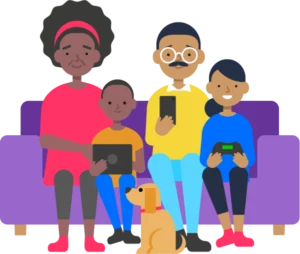When it comes to screen time, you want most of children’s time on devices spent learning and creating. This can support their development for the future while helping build important skills.
Explore tips on helping your child build tech skills over the summer even with limited access to devices.
How can you access technology with no/limited devices at home?
This is such a great question as it really encourages you to think outside the box and take a closer look at what’s happening in your local community. You might be surprised by just how much variety and choice there is, including how many events are happening nearby!
Ideas to get you started
- Local libraries often offer free computer and Wi-Fi access, plus digital learning sessions. If you need to sign up for a library card, it’s usually super quick and easy!
- Community centres and youth clubs may run tech-based workshops or even coding clubs. A quick visit in person to grab a “What’s On” leaflet or checking their website for a downloadable guide can be really helpful.
- Old smartphones or laptops can be repurposed for creative projects like film trailers, gaming tutorial videos or using nature ID apps. You could even go geocaching or, for younger kids, design a nature scavenger hunt and snap a photo of each thing you find! (Easier said than done… spiders don’t always pose for photos).
- Free online resources like BBC Bitesize, Duolingo, or YouTube Kids offer loads of learning and fun, even with minimal tech.
- Setting basic schedules can simplify device-sharing. It’s also great for encouraging collaboration and turn-taking.
Children can learn skills in all kinds of ways that do not look directly like learning. Take playful activities, for example – they can learn so much by navigating a board or card game with a friend or family member.
These games can help children learn a variety of life skills. Such skills include cooperation, critical thinking, communication skills and frustration tolerance, to name a few. Learning these ‘soft skills’ can support children as they grow.
Additional resources for you to use
- Tech We Can: Choose from a range of lessons and videos on all sorts of topics related to technology. You can also choose from low, mid and high tech options for more accessibility. While designed for teachers, the materials come with videos which makes it easier to adapt as parents.
- Searching for ‘kids’ events on Eventbrite. You can set filters to manage location, topic and price (including free). See examples for London, Leeds, Cardiff, Edinburgh and Belfast. While this is a great resource, some places might have fewer events available.
- Explore organisations which might offer discounts or lower prices to families who meet certain criteria. Ultimate Activity Camps, for example, accepts childcare vouchers for partial or full payment. It’s worth reaching out to organisations your child is interested in to see if they offer something similar.
What other skills could you focus on helping your child build?
Critical thinking & problem solving
One of my favourites: use storytelling to teach sequencing and algorithms! Challenge your child to “programme” you to make a sandwich step-by-step. Warning: things might get very messy… and hilarious! Then swap roles and let them try following your instructions.
You can even use this same idea to further explore online safety. What steps would they take if they saw something worrying online? Creating a simple, practical “help guide” together can help build confidence.
Online safety
Make online safety, privacy and respectful communication part of everyday chats. Breakfast, lunch or dinner are perfect times to weave it in. That way, the online world becomes a normal, open topic of conversation.
Roleplay or real-life scenarios are brilliant for exploring how to handle things like screen time, cyberbullying or spotting fake news. It’s all about building awareness in a relaxed, supportive way.
Keyboard confidence
Printable keyboard layouts are a brilliant offline tool. They help kids get familiar with where all the letters and symbols are. It’s super handy for when they do get device time!
Dragons’ Den-style creative tech projects
Unleash your child’s inner inventor! Have them pitch a brand-new video game or app idea on paper. They can design characters, levels and rules, just like a mini game studio.
Or go visual with a tech-themed comic strip: robots, AI pets or time-traveling gadgets!
Even better, encourage co-creation with friends: record a podcast, or film a short documentary together. It’s all about creativity, collaboration and having fun with tech even when screen time is limited.
If you only have your own device, you and your family could get outside with Geocaching or Pokémon GO.
Geocaching is a modern-day treasure hunt where you have to follow coordinates to find the ‘treasure’. This is usually some sort of hidden box called a cache that people hide all over the world. It’s a great way to build directional skills, problem-solving and team work.
Pokémon GO is a classic and perfect for children who like Pokémon. Together, you can find and capture creatures to train and battle with in nearby gyms.
Both are great options for getting outside and moving.
Why is it important for children to focus on skill-building?
It’s so important for parents and carers to focus on children’s skill-building during school holidays or downtime. These moments offer a unique opportunity to grow, often in a more relaxed, flexible way that can be tailored to your child’s interests.
Keep their minds active
Without the structure of school (and I know my kids thrive on routine!), it’s easy to slip into passive habits. That’s why skill-building activities are so valuable. They keep young minds engaged and help prevent the learning loss that can sneak in over long breaks.
Strengthen relationships & build trust
Our young people might not always see us as their first choice when something goes wrong online. But working on things together can really strengthen that bond. You don’t need to have all the answers.
Actually, what really matters is showing you’re a team and that you can figure things out together. Even if it’s just chatting about online safety, these shared experiences can spark meaningful conversations and build trust. A podcast idea could be how things were different when you were younger! What’s changed?
Encourage screen time (yep, really!) & lead by example
Screen time doesn’t have to be a bad thing! When it’s used for active creation and learning, it shifts the focus away from passive doomscrolling and toward something much more positive.
Try it together! Create something, explore a new app or learn a skill side-by-side. It’s a great way to model healthy tech habits and show that screens can be a tool for growth.
What are some free or inexpensive options to help children learn tech-based skills?
After a quick online search, I found the following in-person events:
- Free digital skills sessions in Hertford every Tuesday;
- The Code Zone: Online & In-Person Coding for Kids across various areas in Hertfordshire;
- Code Ninjas: Coding for Kids across the UK.
Web-based resources
- BBC Bitesize: Offers interactive lessons in computing and digital literacy for all age groups.
- Scratch (by MIT): A free platform where kids can learn coding by creating games and animations.
- Code.org: Free coding courses for all ages, including unplugged activities for limited device access.
- Duolingo & Tynker: Duolingo for language learning and Tynker for coding, both offer free versions with engaging, gamified learning.
Apps and platforms
- Thinkrolls: Play & Code (free trial available)
- The Code Zone (free trial available)
- Lightbot (free demo available)
- Oxford Owl (free)
- Teach Your Monster to Read (free on desktop, low-cost app)
- NASA Kids’ Club (free)
Whether it’s free apps, local community clubs or thinking of creative offline activities, there are so many ways to help children build tech skills, no matter what resources you have at home. The key is to keep it fun, flexible and focused on curiosity and creativity!
Endless Learning Academy is my favorite app for young children.









